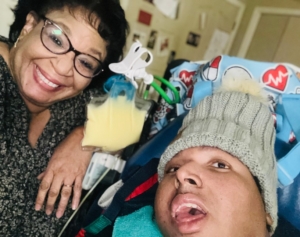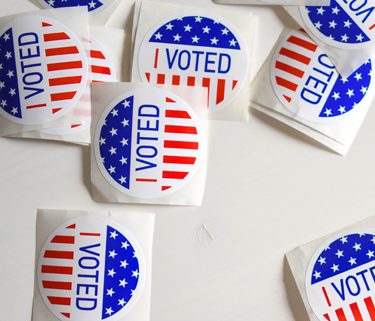Editor’s Note: You can find the latest news on this lawsuit in this case page. If you need assistance to vote, visit www.fvap.gov.
The Arc of the United States, along with The Arc of Texas, The Legal Defense Fund (LDF), Delta Sigma Theta Sorority, the Houston Area Urban League, and ArentFox Schiff, today applauded a decision delivered late Friday, Oct. 11, that struck down certain provisions of S.B. 1, an egregious Texas law that sharply limits voting access.
In the decision from the United States District Court for the Western District of Texas, the judge ruled that several provisions of S.B. 1 that restrict and criminalize voting assistance violate the Voting Rights Act and therefore cannot be enforced.
“This ruling marks a historic victory for voters with disabilities,” said Shira Wakschlag, Senior Director of Legal Advocacy and General Counsel at The Arc of the United States. “The court’s decision demonstrates a deep understanding of S.B. 1’s harmful impact, forcing Texans with disabilities to choose between inadequate voting options or forfeiting their right to vote entirely. The judge’s ruling, influenced by powerful testimony from The Arc’s members, recognizes how S.B. 1 has erected barriers at every stage of the voting process for people with disabilities. Critically, the court understood the far-reaching consequences of S.B. 1, which not only puts care attendants at risk of prosecution but threatens the ability of voters with disabilities to live in the community. The Arc celebrates this landmark decision and remains committed to defending the voting rights of people with disabilities in Texas and nationwide.”
“This victory for voters with disabilities affirms, yet again, what a difference self-advocacy can make,” said Jennifer Martinez, Chief Executive Officer of The Arc of Texas. “I want to thank our members and allies who provided testimony. Without it, the outcome could have been very different, but your willingness to speak up about the unfair barriers you face changed history today.”
“This is a major victory for Texas voters, especially voters with disabilities, voters with low literacy, and voters with limited English proficiency,” said Jennifer A. Holmes, Deputy Director of Litigation at the Legal Defense Fund. “Many of these voters are in Black and Latino communities and face a myriad of obstacles to voting. We are thrilled the court affirmed their right to unfettered assistance to make casting a ballot possible without fear of prosecution of those who assist them.”
“Judge Xavier Rodriguez’s decision in our challenge to Texas Senate Bill 1 is a pivotal victory for democracy and voters who rely on assistance,” said Elsie Cooke-Holmes, National President of Delta Sigma Theta Sorority. “While we celebrate this important win, our work is far from over. We urgently need federal legislation, like the John Lewis Voting Rights Act and the Freedom to Vote Act, which enshrines the comprehensive voting rights reforms our democracy desperately needs following the evisceration of those protections in the 2013 Supreme Court decision in Shelby County v. Holder.”
“The burdens imposed by this law on marginalized communities – specifically voters who could have trouble reading or completing their ballots without assistance – are real and stark,” said J. Michael Showalter, partner at ArentFox Schiff. “The Court heard voluminous testimony as to how the state’s failures to think about how S.B. 1 would work in practice precluded Texans committed to exercise their fundamental right to vote from doing so. We are proud that the Court stepped in and made clear that no one should be criminally prosecuted for providing assistance to voters to allow them to cast their ballots.”
The provisions the Court struck down in Friday’s decision include burdensome disclosure requirements on anyone assisting voters and a ban on compensation for individuals who provide voting assistance. The Court also struck certain language from an oath that Texas law requires assistors to swear under penalty of perjury before they can help voters, a requirement that puts these assistors at risk of criminal prosecution and chills the ability of voters to receive the assistance they need to vote.
The Court ruled that because it is too close to the election to change forms and ballot envelopes, voting assistance disclosures in those materials can still be enforced during the election, but individuals cannot be investigated, prosecuted, or assessed civil penalties related to these requirements. The ruling requires the Secretary of State to stop using the forms after the 2024 election.
Shortly after Texas lawmakers passed S.B. 1 in 2021, the Legal Defense Fund, The Arc of the United States, Reed Smith, and, later, ArentFox Schiff, filed a lawsuit on behalf of Delta Sigma Theta Sorority, Inc., the Houston Area Urban League, The Arc of Texas, and an individual election judge, challenging multiple provisions of the suppressive law. In addition to the provisions restricting voter assistance, the lawsuit also challenged provisions that limited early voting hours, banned 24-hour voting, eliminated drive-thru voting centers, limited multiple drop-off locations for mail ballots, limited the distribution of mail-in ballot applications, imposed burdensome identification requirements on voting by mail, and expanded the authority of partisan poll watchers. Other disability rights and civil rights organizations also challenged the law in companion lawsuits.
Although the Court has yet to rule on all the challenged provisions, it issued prior orders striking down S.B.1’s identification requirements for voting by mail and restrictions on door-to-door canvassing. These rulings have been appealed.
###
Founded in 1940, the Legal Defense Fund (LDF) is the nation’s first civil rights law organization. LDF’s Thurgood Marshall Institute is a multi-disciplinary and collaborative hub within LDF that launches targeted campaigns and undertakes innovative research to shape the civil rights narrative. In media attributions, please refer to us as the Legal Defense Fund or LDF. Please note that LDF has been completely separate from the National Association for the Advancement of Colored People (NAACP) since 1957—although LDF was originally founded by the NAACP and shares its commitment to equal rights.
The Arc of the United States advocates for and serves people with intellectual and developmental disabilities (IDD), including Down syndrome, autism, Fetal Alcohol Spectrum Disorders, cerebral palsy, and other diagnoses. Founded in 1950 by parents who believed their children with IDD deserved more, The Arc is now a network of nearly 600 chapters across the country promoting and protecting the human rights of people with IDD and actively supporting their full inclusion and participation in the community throughout their lifetimes. Through the decades, The Arc has been at the forefront of advances in disability rights and supports. There are over 7 million people with IDD in the United States, which encompasses over 100 different diagnoses. Visit www.thearc.org or follow us @TheArcUS to learn more. Editor’s Note: The Arc is not an acronym; always refer to us as The Arc, not The ARC and never ARC. The Arc should be considered as a title or a phrase.
Delta Sigma Theta Sorority, Inc. was founded on January 13, 1913, by 22 collegiate women at Howard University to promote academic excellence; to provide scholarships; to provide support to the underserved; educate and stimulate participation in the establishment of positive public policy; and to highlight issues and provide solutions for problems in their communities. Since its founding, more than 350,000 women have joined the organization, making it one of the largest predominately Black women’s organizations in the country. Delta Sigma Theta Sorority, Incorporated has more than 1,050 chapters located throughout the United States and globally. The major programs of the Sorority are based upon its Five-Point Programmatic Thrust, which focuses on Economic Development, Educational Development, International Awareness and Involvement, Physical and Mental Health, and Political Awareness and Involvement. To learn more about Delta Sigma Theta Sorority, Incorporated, visit www.deltasigmatheta.org.
As a champion for underserved and marginalized communities, the Houston Area Urban League has a proud history of delivering impactful, lasting benefits to individuals across Greater Houston, regardless of age, gender, race, ability, or background. Our mission is to empower Black people and other marginalized groups to achieve economic self-reliance, equality, influence, and civil rights. We envision a community where these groups experience true equality in opportunities, justice, and prosperity. HAUL operates seven core programs focused on Education and Youth Development, Workforce and Economic Development, Workforce Training, Housing, Social Justice, Health and Wellness, and Entrepreneurship.





 Born at 27 weeks and just over 2 pounds, Logan was small enough to fit in the palm of his mom’s hands. He spent a month in the neonatal intensive care unit on heart monitors and chest tubes, and his lungs collapsed twice. The doctors told his mom that Logan would never talk or speak and that he would be a “vegetable.” But they were wrong.
Born at 27 weeks and just over 2 pounds, Logan was small enough to fit in the palm of his mom’s hands. He spent a month in the neonatal intensive care unit on heart monitors and chest tubes, and his lungs collapsed twice. The doctors told his mom that Logan would never talk or speak and that he would be a “vegetable.” But they were wrong. The current SSI asset limit means that Logan can’t open his own cattle business, since even owning one steer would put him over the limit.
The current SSI asset limit means that Logan can’t open his own cattle business, since even owning one steer would put him over the limit.








 Marcus Stewart’s smile lights up the room as he talks about his dreams and
Marcus Stewart’s smile lights up the room as he talks about his dreams and  Marcus’s mother, Tawana, has been his fierce advocate from day one. “When he was first diagnosed, his first geneticist told me that he’s not going to amount to much. But I said my son will get every opportunity that’s available,” she recalls. “I made myself present in workshops and other groups of parents of children with Down syndrome. I signed him up for sports. I showed up and was very vocal.” She is frustrated by the lack of opportunities for Marcus in adulthood. “Give him a chance,” she pleads. “He gets up every day without an alarm, makes his own meals, never missed a day of school, takes great care of his nephew and our two dogs. He’s more responsible than most people I know, and he’s capable of so much.” Tawana tears up and Marcus puts his arm around her shoulders.
Marcus’s mother, Tawana, has been his fierce advocate from day one. “When he was first diagnosed, his first geneticist told me that he’s not going to amount to much. But I said my son will get every opportunity that’s available,” she recalls. “I made myself present in workshops and other groups of parents of children with Down syndrome. I signed him up for sports. I showed up and was very vocal.” She is frustrated by the lack of opportunities for Marcus in adulthood. “Give him a chance,” she pleads. “He gets up every day without an alarm, makes his own meals, never missed a day of school, takes great care of his nephew and our two dogs. He’s more responsible than most people I know, and he’s capable of so much.” Tawana tears up and Marcus puts his arm around her shoulders. As we celebrate
As we celebrate 

 care for people with IDD. Achieva, a chapter of The Arc, held a roundtable about the HEADs UP Act. It included medical experts, like Dr. Adiaha Spinks-Franklin, and Congressman Seth Moulton.
care for people with IDD. Achieva, a chapter of The Arc, held a roundtable about the HEADs UP Act. It included medical experts, like Dr. Adiaha Spinks-Franklin, and Congressman Seth Moulton.







